英国历史简介英文版
- 格式:pptx
- 大小:3.04 MB
- 文档页数:65
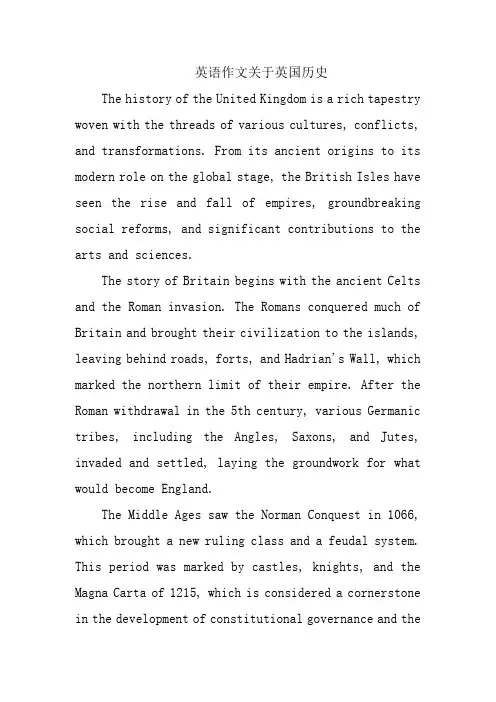
英语作文关于英国历史The history of the United Kingdom is a rich tapestry woven with the threads of various cultures, conflicts, and transformations. From its ancient origins to its modern role on the global stage, the British Isles have seen the rise and fall of empires, groundbreaking social reforms, and significant contributions to the arts and sciences.The story of Britain begins with the ancient Celts and the Roman invasion. The Romans conquered much of Britain and brought their civilization to the islands, leaving behind roads, forts, and Hadrian's Wall, which marked the northern limit of their empire. After the Roman withdrawal in the 5th century, various Germanic tribes, including the Angles, Saxons, and Jutes, invaded and settled, laying the groundwork for what would become England.The Middle Ages saw the Norman Conquest in 1066, which brought a new ruling class and a feudal system. This period was marked by castles, knights, and the Magna Carta of 1215, which is considered a cornerstone in the development of constitutional governance and therule of law.The Tudor period, from 1485 to 1603, was a time of great change. The Reformation split the Christian church in Britain, leading to the establishment of the Church of England. This era also saw the exploration and expansion of the British Empire, with figures like Sir Francis Drake and Walter Raleigh.The 17th and 18th centuries were significant for the growth of the British Empire and the Industrial Revolution. Britain became the world's leading naval power and colonized large parts of North America, the Caribbean, and India. The Industrial Revolution began in Britain and transformed the country from an agrarian society into an industrial powerhouse.The 19th century was a time of social and political reform. The Victorian era, named after Queen Victoria, was characterized by immense progress in science, technology, and culture, but also by deep social inequalities. The Reform Acts expanded the right to vote, and the labor movement fought for workers' rights.The 20th century brought two world wars, whichreshaped the map of Europe and saw the decline of the British Empire. The UK played a pivotal role in both conflicts, but the aftermath of World War II led to a significant reduction in Britain's global influence. Nonetheless, the British cultural influence remained strong, with the spread of the English language and the British Commonwealth.Today, the United Kingdom stands as a modern, multicultural nation with a rich historical legacy. It continues to be an influential player in international politics, science, and culture.中文翻译:英国的历史是一幅丰富的挂毯,由各种文化、冲突和变革的线编织而成。
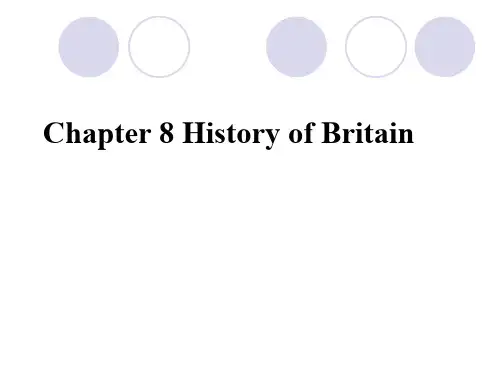
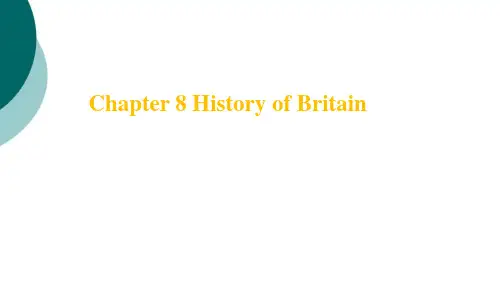
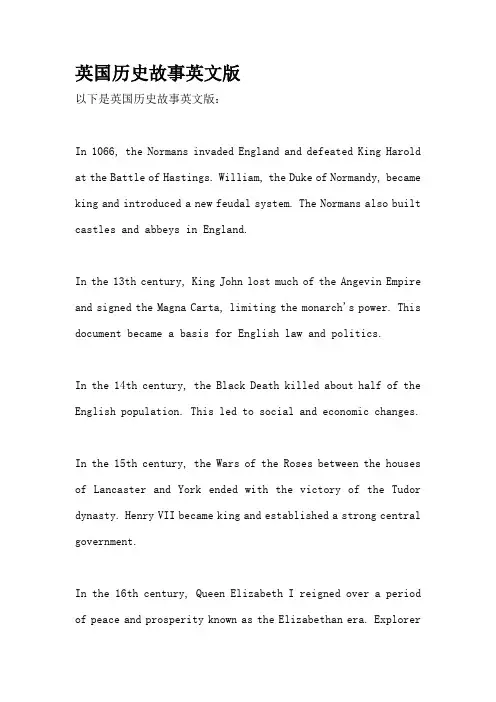
英国历史故事英文版以下是英国历史故事英文版:In 1066, the Normans invaded England and defeated King Harold at the Battle of Hastings. William, the Duke of Normandy, became king and introduced a new feudal system. The Normans also built castles and abbeys in England.In the 13th century, King John lost much of the Angevin Empire and signed the Magna Carta, limiting the monarch's power. This document became a basis for English law and politics.In the 14th century, the Black Death killed about half of the English population. This led to social and economic changes.In the 15th century, the Wars of the Roses between the houses of Lancaster and York ended with the victory of the Tudor dynasty. Henry VII became king and established a strong central government.In the 16th century, Queen Elizabeth I reigned over a period of peace and prosperity known as the Elizabethan era. ExplorerFrancis Drake circumnavigated the world in the Golden Hind.In the 17th century, King James I succeeded Elizabeth and established the Stuart dynasty. The English Civil War broke out in 1642 and ended with the execution of King Charles I in 1649. The monarchy was then abolished and replaced by a republican government known as the Commonwealth of England.希望这个故事能满足您的需求。
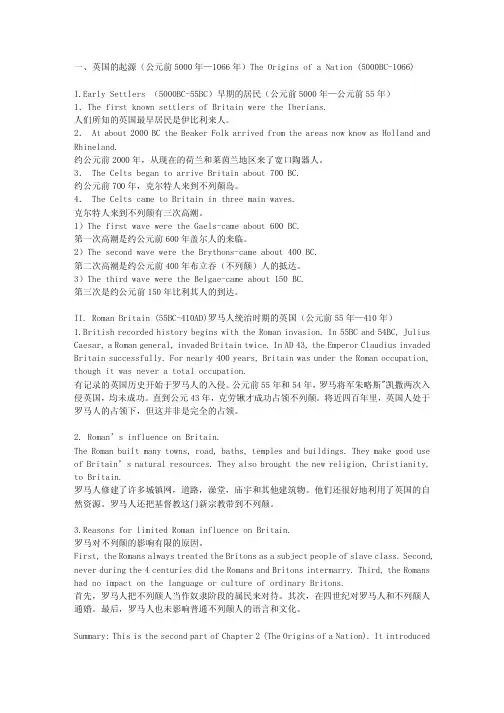
一、英国的起源�公元前5000年—1066年�T h e O r i g i n s o f a N a t i o n(5000B C-1066)I.E a r l y S e t t l e r s�5000B C-55B C�早期的居民�公元前5000年—公元前55年�1�T h e f i r s t k n o w n s e t t l e r s o f B r i t a i n w e r e t h e I b e r i a n s.人们所知的英国最早居民是伊比利来人。
2�A t a b o u t2000B C t h e B e a k e r F o l k a r r i v e d f r o m t h e a r e a s n o w k n o w a s H o l l a n d a n d R h i n e l a n d.约公元前2000年�从现在的荷兰和莱茵兰地区来了宽口陶器人。
3�T h e C e l t s b e g a n t o a r r i v e B r i t a i n a b o u t700B C.约公元前700年�克尔特人来到不列颠岛。
4�T h e C e l t s c a m e t o B r i t a i n i n t h r e e m a i n w a v e s.克尔特人来到不列颠有三次高潮。
1�T h e f i r s t w a v e w e r e t h e G a e l s-c a m e a b o u t600B C.第一次高潮是约公元前600年盖尔人的来临。
2�T h e s e c o n d w a v e w e r e t h e B r y t h o n s-c a m e a b o u t400B C.第二次高潮是约公元前400年布立吞�不列颠�人的抵达。
3�T h e t h i r d w a v e w e r e t h e B e l g a e-c a m e a b o u t150B C.第三次是约公元前150年比利其人的到达。

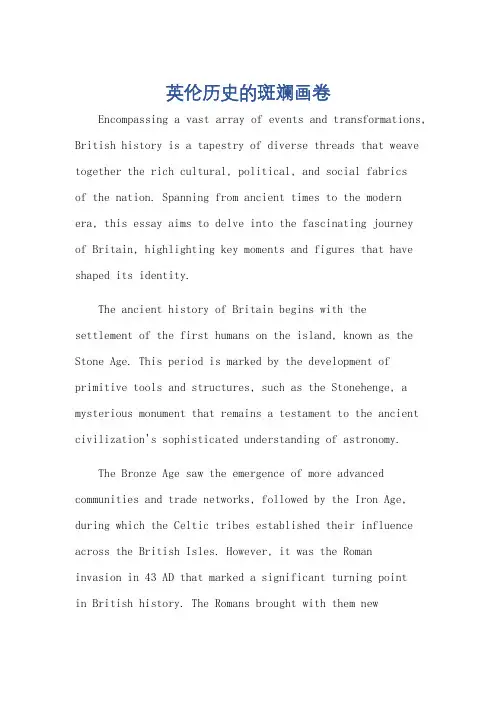
英伦历史的斑斓画卷Encompassing a vast array of events and transformations, British history is a tapestry of diverse threads that weave together the rich cultural, political, and social fabricsof the nation. Spanning from ancient times to the modern era, this essay aims to delve into the fascinating journeyof Britain, highlighting key moments and figures that have shaped its identity.The ancient history of Britain begins with the settlement of the first humans on the island, known as the Stone Age. This period is marked by the development of primitive tools and structures, such as the Stonehenge, a mysterious monument that remains a testament to the ancient civilization's sophisticated understanding of astronomy.The Bronze Age saw the emergence of more advanced communities and trade networks, followed by the Iron Age, during which the Celtic tribes established their influence across the British Isles. However, it was the Romaninvasion in 43 AD that marked a significant turning pointin British history. The Romans brought with them newtechnologies, infrastructure, and a centralized government, leaving a lasting impact on British culture and society.The fall of the Roman Empire in the 5th century led toa period of political instability and cultural fusion known as the Dark Ages. This era was followed by the Norman Conquest of England in 1066, when the French-speaking Normans overthrew the Anglo-Saxon kingdom and established a new feudal system. This event marked a significant shift in the language and culture of England, as French became the language of the government and nobility.The Tudor period, marked by the reigns of Henry VII, Henry VIII, and Elizabeth I, saw the emergence of Englandas a major European power. Henry VII consolidated power and established the Tudor dynasty, while Henry VIII's reign saw significant religious changes, as he broke away from the Roman Catholic Church and established the Church of England. Elizabeth I, known as the "Virgin Queen," presided over a period of economic and cultural prosperity, during which England's naval power and exploration reached new heights.The 17th century marked a period of political upheaval, as the English Civil War erupted between the Royalists andthe Parliamentarians. This conflict ended with theexecution of King Charles I and the establishment of the Commonwealth under Oliver Cromwell. However, theRestoration of the Monarchy in 1660 marked the return ofthe Stuart dynasty and the end of the Puritan era.The 18th century was a time of significant social and economic transformation, known as the Industrial Revolution. This period saw the development of new technologies and manufacturing methods, which led to rapid urbanization and economic growth. The Empire expanded under the leadershipof George III, as Britain emerged as a global power, controlling vast territories and trading networks.The 19th century was marked by furtherindustrialization and imperial expansion. The Victorian era, named after Queen Victoria's long reign, saw significant economic and social progress, as well as the development of major cities like London. However, it was also a period of social and political tensions, as the working class struggled for better conditions and rights.The 20th century brought with it two world wars and significant social and political changes. Britain'sinvolvement in the First World War led to significant casualties and economic hardships, while the Second World War saw the country stand against fascism and emerge as a key ally of the United States and the Soviet Union. Post-war Britain saw the implementation of welfare reforms and the decolonization of its Empire, as well as the electionof the first female prime minister, Margaret Thatcher, in 1979.In conclusion, British history is a rich tapestry of events and transformations that have shaped the nation's identity. From ancient civilizations to modern times, the threads of this history are woven with the stories of brave leaders, innovators, and ordinary people who havecontributed to building a nation that is respected and admired worldwide. As we delve into the past, we gain a deeper understanding of the present and a clearer perspective on the future of this fascinating country.**英国历史的斑斓画卷**英国历史是一幅丰富多彩、交织着各种事件的画卷,这些事件共同塑造了英国丰富多样的文化、政治和社会风貌。
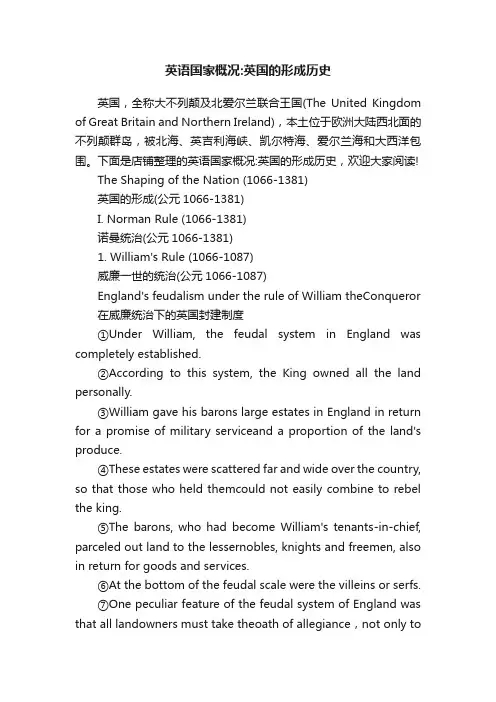
英语国家概况:英国的形成历史英国,全称大不列颠及北爱尔兰联合王国(The United Kingdom of Great Britain and Northern Ireland),本土位于欧洲大陆西北面的不列颠群岛,被北海、英吉利海峡、凯尔特海、爱尔兰海和大西洋包围。
下面是店铺整理的英语国家概况:英国的形成历史,欢迎大家阅读!The Shaping of the Nation (1066-1381)英国的形成(公元1066-1381)I. Norman Rule (1066-1381)诺曼统治(公元1066-1381)1. William's Rule (1066-1087)威廉一世的统治(公元1066-1087)England's feudalism under the rule of William theConqueror 在威廉统治下的英国封建制度①Under William, the feudal system in England was completely established.②According to this system, the King owned all the land personally.③William gave his barons large estates in England in return for a promise of military serviceand a proportion of the land's produce.④These estates were scattered f ar and wide over the country, so that those who held themcould not easily combine to rebel the king.⑤The barons, who had become William's tenants-in-chief, parceled out land to the lessernobles, knights and freemen, also in return for goods and services.⑥At the bottom of the feudal scale were the villeins or serfs.⑦One peculiar feature of the feudal system of England was that all landowners must take theoath of allegiance,not only totheir immediate lord, but also to the king.①在威廉统治下,英国的封建制度得到完全确立。
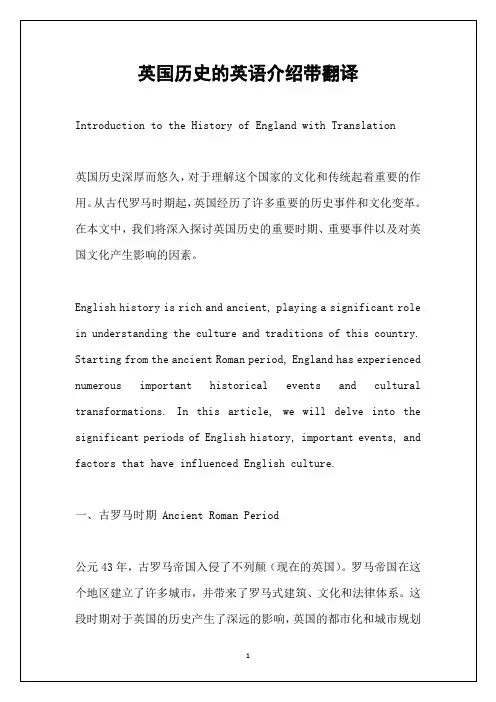
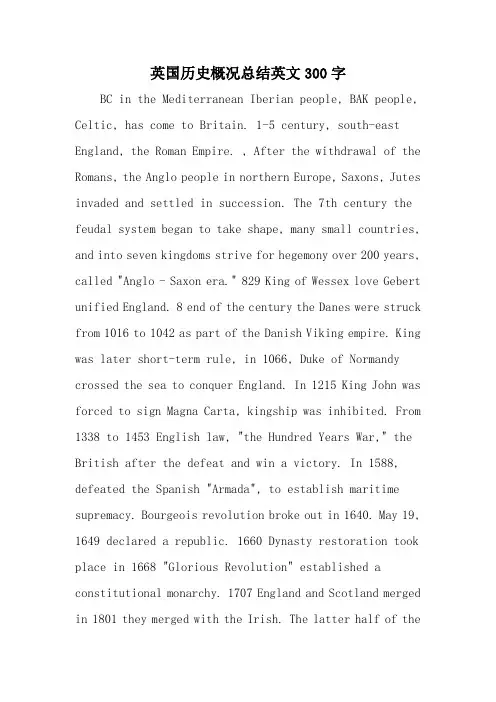
英国历史概况总结英文300字BC in the Mediterranean Iberian people, BAK people, Celtic, has come to Britain. 1-5 century, south-east England, the Roman Empire. , After the withdrawal of the Romans, the Anglo people in northern Europe, Saxons, Jutes invaded and settled in succession. The 7th century the feudal system began to take shape, many small countries, and into seven kingdoms strive for hegemony over 200 years, called "Anglo - Saxon era." 829 King of Wessex love Gebert unified England. 8 end of the century the Danes were struck from 1016 to 1042 as part of the Danish Viking empire. King was later short-term rule, in 1066, Duke of Normandy crossed the sea to conquer England. In 1215 King John was forced to sign Magna Carta, kingship was inhibited. From 1338 to 1453 English law, "the Hundred Years War," the British after the defeat and win a victory. In 1588, defeated the Spanish "Armada", to establish maritime supremacy. Bourgeois revolution broke out in 1640. May 19, 1649 declared a republic. 1660 Dynasty restoration took place in 1668 "Glorious Revolution" established a constitutional monarchy. 1707 England and Scotland merged in 1801 they merged with the Irish. The latter half of the18th century to the first half of the 19th century, becoming the world's first industrial revolution, a complete country. 19th century was the heyday of the British Empire in 1914 the colonial possession of 111 times more than the local big was the first colonial power, claiming to be "follow the sun empire." After World War I began to decay. British in Northern Ireland was established in 1920, the county, and in 1921 to 1922 in southern Ireland, from its rule to allow the establishment of an independent country. Westminster Act, enacted in 1931, was forced to recognize its dominion in the internal affairs and foreign policy of independence, the British Empire, shaken from the colonial system. World War II, greatly weakened the economic strength and political status declined. With the 1947 India and Pakistan have independence, to 60 years, the British Empire, the collapse of the colonial system. In January 1973 to join the EC.。
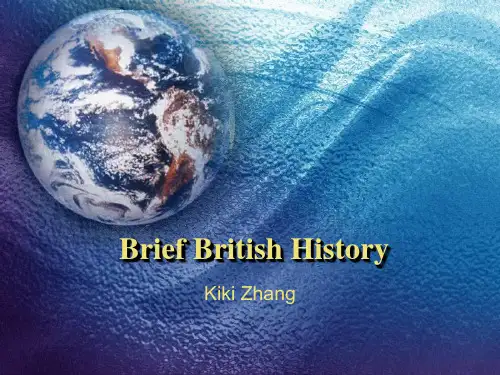
英国介绍英文版作文英文回答:Introduction to the United Kingdom。
The United Kingdom, also known as Britain, is a sovereign island nation located in northwestern Europe. It comprises England, Wales, Scotland, and Northern Ireland. The UK has a rich history, a vibrant culture, and a global influence.Geography and Climate。
The UK is bordered by the North Sea to the east, the English Channel to the south, and the Celtic Sea to the west. The country has a diverse landscape, including rolling hills, mountains, and coastline. The climate is temperate, with mild winters and warm summers.History。
The history of the UK dates back thousands of years, with evidence of human habitation from prehistoric times. The Romans invaded the region in the 1st century AD, and the country was later ruled by various groups, including the Saxons, Vikings, and Normans. The United Kingdom of Great Britain and Ireland was formed in 1801, and the Republic of Ireland seceded in 1922.Politics and Government。
abriefhistoryofBritain英国历史简述(精选五篇)第一篇:a brief history of Britain 英国历史简述A Brief History of Britainby Pam BarrettWhen French and British construction workers met beneath the English Channel in 1990, Britain became linked to Continental Europe for the first time in 7,000 years.For it was then, when the last Ice Age ended, that melting ice flooded the low-lying lands, creating the English Channel and the North Sea and turning Britain into an island.This fact of being “set apart” was one of the two seemingly contradictory factors which would affect every aspect of the country’s subsequent history.The other was a genius for absorbing every invader and immigrant, creating a mongrel breed whose energies would establish an empire incorporating a quarter of the population of the planet.Early settlers: Stone Age people arrived, probably from the Iberian peninsula, in around 3000 BC.They lived by farming but left few traces.The most dramatic ancient monument is Stonehenge in Wiltshire, built during the next 1,000 years.How and why it was built was a mystery, but it must have had religious and political significance.The Beaker people, named after their pottery, were next to arrive.But a more importance wave of immigration, in 700 BC, was that of the Celts from eastern and central Europe.The ancestors of the Highland Scots, the Welsh and the Irish, they left behind a rich legacy of intricate and beautiful metalwork.The Romans: British recorded history began when Julius Caesar first crossed the English Channel in 55 BC.Roman rule continued for nearly 400 years, failing to subjugate only Scottish tribes, whose raiding parties were contained by Emperor Hadrian who built adefended wall right across the north of England.Eventually, threatened by barbarians at the gates of Rome, they abandoned Britain, leaving behind them a network of towns, mostly walled, a superb road system, and a new religion, Christianity.The next wave of invaders from central Europe – Angles, Saxons and Jutes – gradually pushed the native Celts west into Wales and north into Scotland.Anglo-Saxon dominance, too, lasted for four centuries, though it did not extend to Scotland, where a separate kingdom was forged by the Picts and the Scots.Although the Anglo-Saxons were a ferocious bunch, constantly squabbling, they laid the foundations of the English state, dividing the country into shires and devising an effective farming system.Their Teutonic religion, worshipping gods such as Woden and Thor, eclipsed Christianity until, at the end of the 6th century, the monk Augustine(once heard to remark “O Lord, make me chaste, but not yet”)converted the kings and the nobles.Monasteries sprang up, becoming places of learning.Treasures contained in the monasteries were a lure for the Vikings, whose ruthless raids from across the North Sea began in the 9th century.Initially they were defeated at sea by Alfred the Great, founder of the British Navy, but eventually they too were assimilated.Canute, the Danish leader, became king of Britain.The Norman Conquest: Links with Normandy, the part of France settled by the Vikings, were strong, and in 1066 William, Duke of Normandy, claimed the English throne.His triumph at the battle of Hastings decisively changed English history.As W.C.Sellar and R.J.Yeatman put it in their classic humorous history 1066 And All That: “The Norman Conquest was a Good Thing, as from this time onwards England stopped being conquered and thus was able to become top nation.”William parceled out the land to barons in return for their loyalty, and the barons parceled out land in turn to lesser nobles in return for goods and services.At the bottom were the peasants, whose feudal status resembled slavery – hence the potency of the Robin Hood legend, celebrating the Nottingham outlaw who stole from the rich to give to the poor.Although much of the Norman kings’ energies were devoted to protecting their borders, there was a great flowering of Norman culture, producing many erudite historians and scholars.In 1167 Oxford University was founded.Thanks to the influence of William Shakespeare’s history plays, much of the next period of English history is popularly remembered through his view of the shifting alliances of the Plantagenet and Tudor kings who ruled from 1154 to 1547.During this period of conflict and disease –the Black Death alone killed nearly half the population in 1348-49 –the royal succession was by no means assured.Power struggles propelled to the throne those who could command the greatest military backing from the majority of the rival barons, a process vividly illustrated by the Wars of Roses, the tussles between the House of Lancaster and York between 1455 and 1485.Frequent strife with France(including the intermittent Hundred Years’ War from 1337 to 1453)dominated international relationships.Internally, Wales was subjugated by 1288, though Scottish independence was recognized when Robert Bruce defeated English forces at the Battle of Bannockburn in 1314.Britain’s most famous king, Henry VIII, is remembered not only for his six wives(two of whom he had beheaded)but also for bringing about the Reformation, making England a Protestant rather than a Catholic countr y.His quarrel centred on the Pope’s refusal to annul his marriage to Catherine of Aragon, who couldnot oblige him with a male heir.Doctrinal differences aside, however, Henry capitalized on a growing distaste for the church’s excessive privilege and wealt h, and was thus able to get away with seizing enough monastic lands and property to finance his rule.Under Henry, Wales was formally united with England in 1536.The Age of Elizabeth: England entered its Golden Age under Elizabeth I, Henry’s daughter by Ann e Boleyn.The Elizabethan Age has a swashbuckling ring to it: the Virgin Queen and her dashing courtiers;the defeat of the Spanish Armada;Sir Walter Raleigh’s discovery of tobacco in Virginia;Sir Francis Drake’s circumnavigation of the world.Poetry, plays a nd pageantry flourished during her 45-year reign.When Elizabeth, the “Virgin Queen”, died without an heir, the throne passed to James VI of Scotland, who became James I of England, inaugurating the Stuart dynasty and effectively joining together the two kingdoms.The Stuart period was one of conflict between Crown and Parliament.James I, a staunch believer in the Divine Right of Kings, would have preferred no Parliament at all, and Charles I dissolved Parliament and initiated an 11-year period of absolute rule.The upshot was a civil war from 1622 to 1649;Charles lost and was beheaded.A period of republicanism followed, under the rule of Oliver Cromwell, but after his death the monarchy was restored and prospered under Charles II.His brother, who succeeded him as James II, was less circumspect and tried to restore absolute monarchy and the Catholic religion.The newly emerging political parties, growing in confidence, forced him to flee and invited his daughter Mary and her Dutch husband, Prince William of Orang e, to take the throne.This “Glorious Revolution”, although bloodless, was nonetheless a revolution and paved the way for Parliament’s permanent dominance overthe Crown.In 1707 an Act of Union united England and Scotland, although Scotland was allowed to retain its own Church and legislature.Many Scots felt that the union was bulldozed through by English politicians’ intent on improving their international trade prospects, and Scottish pressure to unravel the union is still a political issue.Political pragmatism triumphed again in 1714 when, a reliable Protestant monarch being needed in a hurry, a search through the family tree came up with George I of Hanover in Germany.Although he spoke no English and had little interest in his subjects, he founded a dynasty which was to span 115 years and encompass an expanding empire and an industrial revolution.The age of empire: Despite the loss of its American colonies in 1783, Britain’s trade-driven adventurism was undiminished, giving it control of West Africa and India, Newfoundland and Nova Scotia, some Caribbean island, and Australia and New Zealand.At home, farmers embraced more efficient and profitable methods, which led to the eviction of many peasant farmers who either emigrated to the New World, carrying with them a resentment that would bequeathed to future generations, or left the land to find work in the towns, which rapidly became overcrowded.This combination of landowners with surplus capital to invest and laborers in search of a living was one reason why British became the first country to industrialize.Political stability helped too, as did the security of being an island, natural resources, good trade arrangements and a native genius for inventing things.The Scottish inventor James Watt modified and improved the steam engine in the 1770s, opening the way for the efficient powering of trains, ships and factory machinery.The invention of the Spinning Jenny and the power loom created mass production in textiles.The smelting ofiron with coke, instead of charcoal, hugely increased the production of iron.A massive building program of railways, roads and canals created a new class of industrialist, whose fortunes rivaled those of the aristocracy.But it also created abominable working conditions in mines and factories, conditions which led to the slow and painful development of trade unionism.Political reforms, seized elsewhere in Europe by revolution, came gradually in Britain.Parliamentary seats were distributed more fairly among the growing new towns, but voting was still based on property ownership and universal suffrage didn’t come until 1918(and even then was scarcely universal since it excluded women under 30).The problem that dominated parliamentary debate during this period was the intractable Irish Question.The resentment over centuries of British rule in Ireland bubbled to the surface after the potato famines of the mid-1840s, when about 20 percent of Ireland’s population died of starvation and more than a million people emigrated to escape a similar fate.Demands for Irish independence grew but they were demands which many English politicians, conscious of the security problems of having an independent and possibly none-too-friendly neighbor to their west, were reluctant to grant.As with today’s IRA campai gn, the debate had a backdrop of violence.T oday, however, the Victorian Age is remembered as a time of exuberant self-confidence, symbolized by the building in London of the Crystal Palace to showcase Britain’s industrial and technical achievements in the Great Exhibition of 1851.But many of London’s inhabitants might well have wondered when they would benefit from all these accomplishments.For them, the squalor and crime which Charles Dickens portrayed so evocatively in his novels were all too real.Working-class lifeimproved considerably during the last quarter of the 19th century.Many homes had gas lighting and streets were cleaned by the new municipal councils.A new police force contained crime.The music hall provided inexpensive entertainment in towns.Bicycles became a common method of transport, and a trip by train to seaside resorts was for many a highlight of summer.In London, trains in the world’s first underground railway began puffing their way through smoke-filled tunnels between Paddington and Farrington in 1863.Art and drama flourished.By the time of Queen Victoria’s Diamond Jubilee in 1897, the country was feeling quite pleased with itself.Britannia ruled the waves, and anything seemed possible.The 20th century: But all good things come to an end.The Boer War of 1900 ended in victory for the British in South Africa but damaged its international reputation.France, Germany and America were becoming powerful competitors for world markets.The newly united German state was flexing its military muscles.The Edwardian era of the early 20th century, seemingly an idyllic time, was built on shifting sands.Dragged into World War I by a complex web of international alliances, Britain faced unimaginable carnage in which more than a million of its young men died.Social unrest at the end of the war, though less devastating than in the defeated Germany, gave more power to women(who had shouldered a heavy burden while the men were at war)and led to a General Strike by dissatisfied workers in 1926.The Irish Question was partly answered with the creation of an independent Irish free State, but six Protestant-dominated counties in the north stayed under UK rule – a time bomb which exploded in 1969.The shock waves from the 1929 New York Stock Market crash plunged Britain into depression, throwing millionsout of work, especially in the industrial areas of northern England, south Wales and Clydeside in Scotland.The monarchy was rocked by crisis in 1936 when Edward VIII, who had just become king, decided to marry the twice-divorced Mrs Wallis Simpson.His family, the church and the government opposed the match, forcing him to abdicate.His brother, a reluctant George VI, restored the monarchy’s popularity, not least through the support which he and his wife Elizabeth(later the Queen Mother)gave to their subjects during the German air raids of World War II.Although Britain’s island status saved it from invasion, this war involved civilians in an unprecedented way.Cities like Coventry were devastated by bombing and the Blitz radically changed the face of London for the first time since the Great Fire of 1666.Many children were sent to live in the countryside.Most social inequalities were set aside during the war and, when peace returned in 1945, voters turned to the Labour party in hope that it could develop an even greater egalitarianism.It laid the basis of a welfare state, providing free medical care for everyone as well as financial help for the old, the sick and the unemployed.But the war had left Britain broke.While Germany and Japan rebuilt their industries almost from scratch, helped by international aid, Britain was left to patch together a severely damaged economy.It could no longer sustain an empire, and gradually its colonies became independent.Many former subjects, especially from the Caribbean and the Indian sub-continent, settled in Britain, raising fears of racial conflict that, despite some serious tensions, were never(quite)fulfilled.As the austere 1950s gave way to the ’60s, things started to look up.New universities were built, a motorway network launched, and a reinvigorated culture promoted by a group of writersdubbed “the angry young men”.Much of the explosion of new talent came from the north of England: actors like Albert Finney, playwrights like Alan Sillitoe, and pop groups galore, led by the Beatles.The swinging Sixties, powered by a newly affluent youth, had arrived.Britain’s heavy industry might be in trouble, but in fashion and pop music it led the world.The good times died in the 1970s as inflation and unemployment soared and labour unrest led to endless strikes.Joining the European Community in 1973 seemed to produce few obvious economic benefits and revenues from North Sea oil were quickly spent rather than invested.Margaret Thatcher came to power in 1979 promising tough new policies.Her popularity quickly faded, but was revived in 1982 by the Falklands War when an invading Argentinean force was beaten off the South Atlantic islands, remnants of the old empire.Although she went on to win two further elections convincingly, by 1990 her popularity, always firmer abroad than at home, was so shaky that her party, fearing that she would not win them the next election, replaced her with a less combative leader, John Major.He duly won the 1992 election, but a reinvigorated Labour Party under T ony Blair won in 1997.The overall problems did not change, though.The economy remained weak, distrust of the European Community did not abate, nationalism simmered in Wales and Scotland, the conflict in Northern Ireland dra gged on, and the Royal Family’s private life continued to obsess the tabloid press.It was business as usual, in fact – which, in a country obsessed by continuity, was immensely reassuring.第二篇:材料学的历史简述姓名:何莞晨学号:2014012075材料学的历史简述1.按材料划分的时代生活离不开材料,人类的一切生产活动所需的工具都建立在合适的材料的基础上。
英语作文英国历史English: The history of Britain is a rich tapestry woven with conquests, conflicts, and cultural exchanges. From the Roman invasion in 43 AD to the Norman Conquest in 1066, Britain has been shaped by various rulers, each leaving their mark on the country. The Renaissance brought about a renewed interest in the arts and sciences, leading to the flourishing of literature and the exploration of new worlds. The industrial revolution transformed Britain into a global powerhouse, with its technological innovations and vast empire spanning across the globe. Throughout its history, Britain has faced many challenges, such as religious conflicts, political revolutions, and world wars, but has emerged as a resilient and influential nation in the modern world.中文翻译: 英国的历史是一个丰富多彩的图景,由征服、冲突和文化交流编织而成。
自公元43年的罗马入侵到1066年的诺曼征服,英国被各种君主塑造,每位都在这个国家留下了痕迹。
英国历史英语作文80词The history of Britain is a tapestry of rich cultural threads, weaving together diverse stories of conquest, revolution, and progress. From the ancient Roman occupation to the Norman invasion, the story of Britain is marked by foreign influence and internal struggle. The Middle Ages saw the emergence of powerful monarchs like King Arthur and the Norman Kings, who left lasting impacts on the country's political and cultural landscape. The Tudor period marked a renaissance in literature, art, and exploration, with Queen Elizabeth I presiding over a golden age of English culture. The Industrial Revolution transformed Britain into a global superpower, shaping not just its economy but also itssocial and political landscape. The 20th century sawBritain involved in two world wars, emerging as a key ally in the fight against fascism. Today, Britain stands as a symbol of democratic values and economic prowess, a testament to its rich and storied history.**英国历史的独特轨迹**英国历史是一幅丰富多彩的文化织锦,编织着征服、革命和进步的多样化故事。